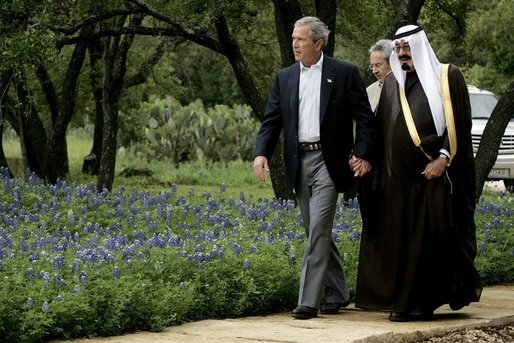Wolfrum at Shakesville alerts us to The New Right's attempt to lay our failed energy policies every but at the feet of Republicans:
Take the post "How did the GOP get stuck "Defending Big Oil" again?"
Now, this post could have been just five words long: "Because that's what they do." But the post is more about how to change the oil debate to make the GOP look better rather than on how to do anything about oil prices:
First, I don't see any reason at all we need to keep getting stuck with the "defending tax breaks for big oil" charge over and over again. Subsidies are not a free market principle. Let's cut 'em and get the issue off the table.
Ok, with you so far.
Second, start talking about the Saudis. The Democrats are winning this debate because they've offered domestic oil companies up as a handy scapegoat. We've got to change the narrative and start focusing criticism on, gee I don't know, the international cartel of terrorist funding despots that actually controls the oil supply? Of course, the legions of lobbyists and public affairs shops that the Saudi's have retained around DC have absolutely nothing to do with why they haven't been the subject of criticism.
The problem isn't "the legions of lobbyists and public affairs shops that the Saudi's have retained around DC"--it's a little more fundamental to the core of the Republican Party:

Like Wolfrum said, "Because that's what they do."

Yes, but there's also the possibility that they're not pumping more oil because they can't pump more oil. Given that, you can hardly blame them for getting as much as they can for what they do pump.
Plus it's kinda stretching it a bit to say the Saudis (or even OPEC as whole) "control the oil supply". The US's two biggest oil suppliers are Canada and Mexico. Saudi Arabia only supplies about 9% of US oil imports.
Dunc,
I've seen before that the middle east is not the US's main supplier of oil. Do you have a quick reference I can use?
thanks
It does not matter whether the Middle East is the main US supplier of oil - because it is the World's biggest supplier of oil and oil is global commodity.
Too bad we cannot blame the ethanol boondoggle soley on the Republicans. Obama is on record opposing a relaxation of sugar tariffs that would allow the more economically and ecologically viable cane-based ethanol to be imported. Unfortunately while the Republicans are in thrall to the Saudis, both parties are in thrall to ADM and the farm lobby
The US's two biggest oil suppliers are Canada and Mexico.
Pleeeease don't remind the Republicans that Canada has almost as much oil as Saudi Arabia! Once we boot the Stephen Harper government out, we could wind up being next on the list of targets for "regime change"!
It doesn't matter who the supplier to the US is. It's a globally traded commodity. As such all that counts is the global supply. There are a few exceptions - for instance most of Venezuala's oil, as I understand it, can only be primarily refined in the US. Likewise I think there are similar issues with the Canadian tar sands.
But the idea that the Saudis at this stage could do much is pretty wishful thinking. Further even if the price of oil went down significantly (say to the $60/barrel price the Saudis say is ideal) that would affect limits in refiner capacity. Likewise going down to $60 a barrel is pretty unrealistic given the Bush strategy of letting the dollar fall. While capacity and demand is where a lot of focus has been placed of late the worth of the dollar has a lot to do with current prices. (Oil is traded in US dollars) Then you throw in all the speculators and it's unlikely things will change that dramatically even if there is a bubble in the market that appears akin to the housing market.
Sure thing... For all US energy matters, the primary source is the Energy Information Administration.
On this particular question, see Crude imports by country of origin.
A bit off topic, but given the picture - if anyone wants to read how snuggly Dubya is with Bandar, I'd suggest "House of Bush, House of Saud". After reading it, you'll have a bit more insight into the machinations of these guys.